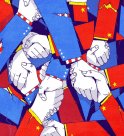On May 4 this year, I attended the launch conference of the World Winter Cultural Studies Issue of the World Huaju Cultural Sciences held in the Nan'an Association of Singapore.New expansion speech.Zhao Baisheng mentioned the book of Chinese vulgar literature by Zheng Zhenduo, a May 4th writer. He believes that Zheng Zhenduo has become the center of the history of Chinese literature due to the discussion of "vulgar literature".
"Vulgar Literature" is popular literature and folk literature.Zheng Zhenduo once listed the six major characteristics for customs literature: 1. Volkswagen; 2. The collective creation of unknown groups; 3. Oral transmission; fourth, fresh, but vulgar; 5. Its imagination is often very unrestrained, but there are also also someVarious disadvantages; 6. Courage to introduce new things.
Folk literature has spread to Southeast Asia and other places with the footsteps of Chinese immigrants.Guo Huifen, an associate professor at Xiamen University, pointed out from May 4th to the New Century: The history of the development of Chinese new poems in Myanmar pointed out that in the mid -to -late 1930s, with the pace of Japanese aggression in China, the Chinese literary scene set off a literary and artistic campaign in the Chinese literary world.In addition to the anti -Japanese wave of anti -Japanese anger, the Burmese poetry also uses the form of the combination of old poems and folk songs to stimulate the emotions of the Burmese people's anti -Japanese war and rescue;Essence
In addition, according to the history of overseas Chinese literature edited by Chen Xianmao, the creation of folk stories, folk poetry, myths and legends, fables such as folk poetry and mythology, and fables in Cambodia have achieved almost surpassing Cambodian prose and poetry.The development of folk literature is not only a reflection of Cambodia's long and mysterious culture, but also reflects the aesthetic tendency of Cambodian authors.
As for the Chinese literature of Singapore, in 1932, the 26 -year -old Liu Beibei signed before the south came to the south to assist Nanjing's Zhengzhong Book Company to edit the Sumatra folk story.
In 2002 and 2006, Hainan Ballad Slang, edited by Mohe, and Hainan folk rumors, came out.The income of these two books is circulated in Hainan ballads, folk and slang in Southeast Asia, and also brings together some of these folk languages spread in Hainan Province.
Xu Yongshun's Singapore Chinese Opera Compilation (2009), Associate Professor Ke Siren's popularity: Singapore Chinese Drama 1913-2013 (2013), Dr. Xu Zhenyi's Bobo Nantou -the spread and change of Chinese folk literature and art in Singapore (2018) Wait, leave precious literature for Xinhua folk literature.
A papers that are almost forgotten
In 2010, under the guidance of Chen Ronglan, a professor at Xiamen University, the 1990 Singapore Cultural Award winner Han Yongyuan completed the research of the function of traditional song art works in Singapore Chinese teaching in Singapore.Writing.This is a practical but almost forgotten paper.Han Yongyuan was a senior drama and cross talk actor. He was also the principal of the Chinese Language Center established in 1993. The goal of knowing the Chinese primary and secondary school curriculum of the Ministry of Education is to let students learn to use and experience the joy of learning Chinese.This paper can be described as compatible with the author's professional knowledge and practical experience in the two fields.
According to Han Yongyuan's observation, in more than 300 Chinese traditional song arts, there are more songs, allegro, and cross talks are more suitable for the Chinese teaching environment in Singapore.The Chinese Literature Center has launched the "Art Language Training Course". The course mainly uses Allegro as a language training and has a textbook for training allegro actors. In the above paper, Han Yongyuan incorporates a lot of practical experience and examples.
Han Yongyuan pointed out in the paper that from schools, private schools to social activities, they all realize that traditional song art helps cultural heritage and language teaching to a certain extent. These backgrounds provide good reference materials for his research.
For example, in Chinese textbooks in Singapore, passwords, allegro and cross talk works are relatively scarce, but some private schools will compile such interesting works into the textbooks in their own textbooks.In some private schools, in the pre -school stages, they use passwords as assistant textbooks. In other grades in elementary school, they use cross talk appreciation as the introduction textbook.
No matter how much, in some schools, Chinese teachers use cross talks and Allegro as a medium in the student's curriculum activities, and use these two entertaining forms to improve their interest in learning Chinese.Although these activities focus on art appreciation and do not directly linked to Chinese learning, students can find the cultural landscape behind the language from appreciation, and have the opportunity to dig the harmonious interest and charm hidden in the language.
As for society, although the atmosphere of appreciation of Allegro and cross talk is not strong, there are crosstalk competitions or performances every year.The performance of a good level of the adolescent radio show, as well as some cross talk performances from mainland China and Taiwan, gives students the opportunity to enjoy the two songs of cross talks and Allegro, and will also have a certain perceptual foundation in their understanding.
Place the Chinese Teaching Interpretation Method
Han Yongyuan started the master's course in 2006, when he was 59 years old.Facing the changes in the language environment and the difficulties encountered by Chinese students to learn Chinese, some Chinese children even developed their mentality to abandon Chinese.How to make Chinese teaching rich and diverse and flexible and vivid, different Chinese educators have different interpretations and practices.Han Yongyuan realized that adopting the ground -to -earth education in music, the role of Chinese folk song arts is worth studying; he faced the difficulties at the time, and was willing to explore, sort out and sort out the Chinese teaching method in this area in the year of the flower armor.induction.
Quyi is a major category of Chinese folk verbal literature, and it is also part of the Chinese culture in Singapore.Based on the advantage of Chinese culture, Han Yongyuan tried to start from the language charm and cultural connotation of winding, allegro and cross talk, analyze their different functions that Singapore students appreciated in Chinese learning and actual learning, and are suitableThe self -editing and adaptation of teaching materials for the local language environment as a teaching case, given the reference of educators who are interested in incorporating Quyi into Chinese textbooks, thereby strengthening Singapore's Chinese teaching.
In 2008, Han Yongyuan held a series of crosstalk lectures for students in two and 10 classes in San Nidella's school, using a school competition as a completion.From 2011 to 2014, he served as a guest lecturer at the Singapore Chinese Teaching and Research Center to teach humor and teaching fun. The object was teachers from middle schools and junior colleges.EssenceOptimizing Chinese teaching through Singapore Chinese Culture is the expectation of Han Yongyuan as a cultural worker. It is believed that it is also one of the core goals of Singapore Chinese culture in the current shape.
The author is a local writer



